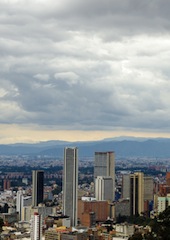Can Young People Rebuild Colombia’s Social Capital?
Can a new generation of Colombians build a brighter future for their country?
May 25, 2013

Imagine you were given the task of managing a branding exercise to introduce the South American country of Colombia to the world as an attractive destination for trade, investment, education and tourism. It would be a tough gig.
After all, Colombia is the place which, just a decade ago, had the highest homicide rate in the world and where a third of members of parliament had links to paramilitary groups.
Despite the amazing efforts of the past decade, thanks in part to the policy of ‘democratic security’ initiated by then-President Alvaro Uribe, many parts of the country outside the main cities do still suffer from guerilla violence.
Colombia’s trade unionists, in particular, have been targeted — as documented by Harvard political scientist James A. Robinson, the co-author of the celebrated book Why Nations Fail — even though the government has made serious efforts to reduce these attacks.
On a recent visit to Bogota, the capital of Colombia, I actually met with the man in charge of selling the city and the country to the world, David Mello. He explained that despite its history, that Colombia and Bogota had plenty of going for it.
“We are five hours flight time away from New York, Mexico City and Sao Paulo. Bogota attracts 78% of all foreign direct investment that comes to Colombia.
“We are growing new parts of the economy, such as professional services, engineering, light manufacturing, life sciences, biotechnology and information and capital services.”
Mello is also proud of Bogota’s social agenda: “Our program Bogota Humana celebrates diversity in the city in terms of tolerance of Colombia’s different races, religions and gender preferences.
“We want to promote human development and reduce discrimination, so that the city can be regarded as a cultural, tolerant hub of creativity and culture. We are very proud of the fact that Bogota was selected as one of UNESCO’s World Cities of Music.”
Mello is an example of the new generation of young Colombians eager and determined to project a different image to the world than was the case in its troubled past.
Every major business leader I met in government and chambers of commerce in Bogota (and in Medellin on a previous visit to Colombia) was under 40, highly educated and had international experience.
For example, Ana Milena Cortazar Mejia, the International head of ANDI, Colombia’s main chamber of commerce group, is young and accomplished, equipped with multiple degrees, has lived in China and Japan and speaks Mandarin.
She explains: “Young Colombians have a worldview where we look to Asia just as much as we look to Europe or the rest of the Americas. And we see Australia as a great reference point to Asia, an important bridge.”
In fact, Australia is seen as a symbol of good practice in business and economic management.
In particular, the emerging Colombian resources sector faces key challenges — dealing with the environment, community issues, indigenous rights and tensions with agricultural land owners — that Australia has had to contend with in the past.
A visit to the Terranova project, a coalmine owned by Australia’s New Age Exploration, showed what is needed in Colombia.
The mine has good quality coal, but its antiquated mining practices require an injection of capital to lift its occupational health and safety standards, which it will soon get.
Many Colombian mine managers are Australian-educated, including New Age Exploration’s Carlos Felipe Barrera who studied at graduate level at the University of New South Wales (UNSW).
Barrera believes his education in Australia was pivotal to his career in the resources sector.
“Australians are highly professional, practical and easy to work with. Studying there made a big difference,” Barrera said.
“I was among people from different cultures from all over the world, particularly Asia. This experience advanced my professional development when I returned to Colombia. Australia was an excellent bridge to Asia for me personally.”
The personal benefit of academic training abroad aside, Colombian students have become very active in promoting their country. The new generation makes for good and effective ambassadors internationally, representing a credible break with the past.
The country’s legacy issues — drug wars, high crime rates and political unrest — still threaten Colombia’s future.
But at least there is a generation in place now that is determined to turn things around and is helping their home country to realize its full potential.
The steps they are taking, in some sense, may still be baby steps — but even these are important ones.
Recently, young Colombians ran a social network campaign to ensure that foreigners spelt their country’s name right (that is, Colombia with an “o”, not Columbia with a “u” — as in Columbia University or British Columbia in Canada).
That is a start, signaling the will to turn the Colombian brand around. No doubt, relying on the strength and energy of its young educated, internationally focused population is far more credible a move than anything any politician could ever say or do.
As Monica Ramirez, a young Colombian business professional, put it to me: “Our generation in Colombia is part of a ‘small and silent revolution’ to turn around our international image and economic fortunes.
“Colombians used to believe in education so they could get out of the country, Now, we invest in education so we can stay and make a contribution to the country’s future.”
Takeaways
Young Colombians used to believe in education only as a way to get out of the country.
Young citizens now invest in education so they can stay and contribute to the country's future.
Young Colombians recently ran a social media effort to get the world to spell the country's name right.
It's part of a branding campaign to show the world that the country has lots of economic potential.
Read previous

Did Obama Love Drones Too Much?
May 24, 2013
